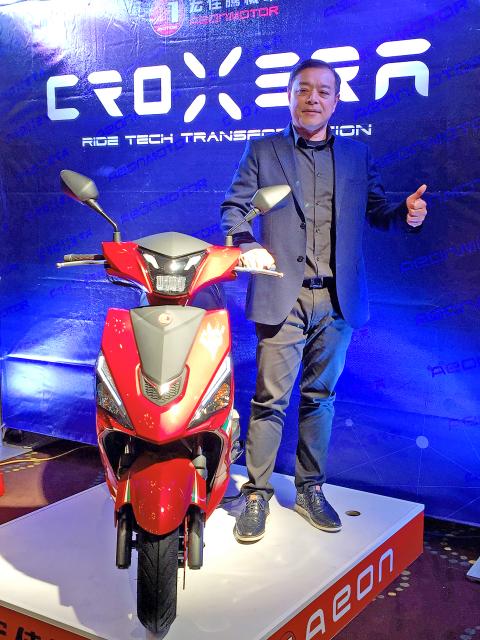Motorcycle vendor Aeon Motor Co (宏佳騰) expects its business in the second half of the year to outperform that in the first half as orders for all-terrain vehicles (ATVs) grow and its first electric scooter enters the market this summer.
“Orders for our ATVs are expected to rise every quarter, thanks to higher demand from US clients, including Polaris Industries Inc and Yamaha Motor Corp USA,” a public relations official, who asked to remain anonymous, told the Taipei Times by telephone.
Given robust ATV sales this year, Aeon reported a 37.12 percent increase in revenue for the first five months to NT$1.08 billion (US$34.84 million), compared with NT$786.02 million a year earlier.

Photo: Yang Ya-min, Taipei Times
“We also expect motorcycle shipments to surpass 100,000 units this year, bolstered by sales of AI-1 electric scooters and gasoline-powered Dory 115 scooters,” he said.
The AI-1 electric scooter, which is scheduled to enter the market this summer, is a collaboration with Gogoro Inc (睿能創意) and uses Gogoro’s battery swapping system, the official said.
The AI-1’s smart dashboard provides riders with audio road guidance, as well as alarms for speed limits and calls, the company said.
The official declined to give more details about the AI-1, including its price tag.
The prices of similar electric scooters, such as the Yamaha EC-05 and Gogoro S2 series, are close to NT$100,000, according to the companies’ Web sites.
Aeon entered the Chinese market late last year and is planning to produce heavy motorcycles at its Chinese unit this or next quarter, the company said.
The company held its annual general meeting on Thursday last week in Tainan, where shareholders approved the company’s plan to distribute a cash dividend of NT$1 per common share and a stock dividend of 0.2 percent.
The cash dividend represents a payout ratio of 27.86 percent based on last year’s earnings per share of NT$3.59 and implies a dividend yield of 2.25 percent based on the stock’s closing price of NT$44.50 yesterday.

South Korea’s equity benchmark yesterday crossed a new milestone just a month after surpassing the once-unthinkable 5,000 mark as surging global memory demand powers the country’s biggest chipmakers. The KOSPI advanced as much as 2.6 percent to a record 6,123, with Samsung Electronics Co and SK Hynix Inc each gaining more than 2 percent. With the benchmark now up 45 percent this year, South Korea’s stock market capitalization has also moved past France’s, following last month’s overtaking of Germany’s. Long overlooked by foreign funds, despite being undervalued, South Korean stocks have now emerged as clear winners in the global market. The so-called “artificial intelligence

NEW IDENTITY: Known for its software, India has expanded into hardware, with its semiconductor industry growing from US$38bn in 2023 to US$45bn to US$50bn India on Saturday inaugurated its first semiconductor assembly and test facility, a milestone in the government’s push to reduce dependence on foreign chipmakers and stake a claim in a sector dominated by China. Indian Prime Minister Narendra Modi opened US firm Micron Technology Inc’s semiconductor assembly, test and packaging unit in his home state of Gujarat, hailing the “dawn of a new era” for India’s technology ambitions. “When young Indians look back in the future, they will see this decade as the turning point in our tech future,” Modi told the event, which was broadcast on his YouTube channel. The plant would convert

‘SEISMIC SHIFT’: The researcher forecast there would be about 1.1 billion mobile shipments this year, down from 1.26 billion the prior year and erasing years of gains The global smartphone market is expected to contract 12.9 percent this year due to the unprecedented memorychip shortage, marking “a crisis like no other,” researcher International Data Corp (IDC) said. The new forecast, a dramatic revision down from earlier estimates, gives the latest accounting of the ongoing memory crunch that is affecting every corner of the electronics industry. The demand for advanced memory to power artificial intelligence (AI) tasks has drained global supply until well into next year and jeopardizes the business model of many smartphone makers. IDC forecast about 1.1 billion mobile shipments this year, down from 1.26 billion the prior

People stand in a Pokemon store in Tokyo on Thursday. One of the world highest-grossing franchises is celebrated its 30th anniversary yesterday.